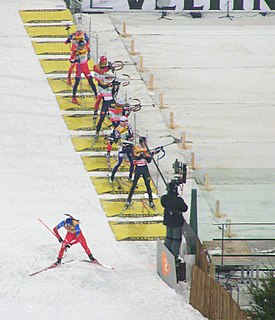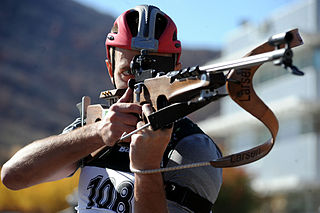
The biathlon is a winter sport that combines cross-country skiing and rifle shooting. It is treated as a race, with contestants skiing through a cross-country trail whose distance is divided into shooting rounds. The shooting rounds are not timed per se, but depending on the competition, missed shots result in extra distance or time being added to the contestant's total.

The 1964 Winter Olympics, officially known as the IX Olympic Winter Games and commonly known as Innsbruck 1964, was a winter multi-sport event which was celebrated in Innsbruck, Austria, from January 29 to February 9, 1964. The city was already an Olympic candidate, unsuccessfully bidding to host the 1960 Games. Innsbruck won the 1964 Games bid defeating the cities of Calgary in Canada and Lahti in Finland. The sports venues, many of which were built for the Games, were located within a radius of twenty kilometers around Innsbruck. The Games included 1,091 athletes from 36 nations, which was a record for the Winter Games at the time. Athletes participated in six sports and ten disciplines which bring together a total of thirty-four official events, seven more than the 1960. The luge made its debut on the Olympic program. Three Asian nations made their Winter Games debut: North Korea, India and Mongolia.

Miriam Neureuther is a former German biathlete and cross-country skier. She has won an Olympic silver medal in cross-country skiing and two biathlon world championship titles, all in team events. Noted for her fast skiing performances, she won two junior world championship titles in biathlon in 2008 and 2009. Gössner was called up for the Nordic World Ski Championships 2009, where she was part of Germany's cross-country team claiming silver in the 4 × 5 kilometre relay.
The Men's 4 x 7.5 kilometre biathlon relay competition at the 2006 Winter Olympics in Turin, Italy was held on 21 February, at Cesana San Sicario. Each national team consisted of four members, with each skiing 7.5 kilometres and shooting twice, once prone and once standing.
The Women's 4 x 6 kilometre biathlon relay competition at the 2006 Winter Olympics in Turin, Italy was held on 23 February, at Cesana San Sicario. Each national team consisted of four members, with each skiing 6 kilometres and shooting twice, once prone and once standing.
The 2009–10 Biathlon World Cup – Relay Men will start at Sunday December 6, 2009 in Östersund and will finish Friday February 26, 2009 in Vancouver at the olympic Biathlon event. Defending titlist is Austrian team.
The 2009–10 Biathlon World Cup – Relay Women will start at Sunday December 6, 2009 in Östersund and will finish Tuesday February 23, 2009 in Vancouver at the olympic Biathlon event. Defending titlist is German team.
The Men's 4 x 7.5 kilometre biathlon relay competition at the 2002 Winter Olympics 20 February, at Soldier Hollow. Each national team consisted of four members, with each skiing 7.5 kilometres and shooting twice, once prone and once standing.
The Women's 4 x 7.5 kilometre biathlon relay competition at the 2002 Winter Olympics 18 February, at Soldier Hollow. Each national team consisted of four members, with each skiing 7.5 kilometres and shooting twice, once prone and once standing.
The Men's 4 x 7.5 kilometre biathlon relay competition at the 1998 Winter Olympics 21 February, at Nozawa Onsen. Each national team consisted of four members, with each skiing 7.5 kilometres and shooting twice, once prone and once standing.
The Women's 4 x 7.5 kilometre biathlon relay competition at the 1998 Winter Olympics 19 February, at Nozawa Onsen. Each national team consisted of four members, with each skiing 7.5 kilometres and shooting twice, once prone and once standing.
The Men's 4 x 7.5 kilometre biathlon relay competition at the 1992 Winter Olympics was held on 16 February at Les Saisies. Each national team consisted of four members, with each skiing 7.5 kilometres and shooting twice, once prone and once standing.
The Women's 3 x 7.5 kilometre biathlon relay competition at the 1992 Winter Olympics 14 February, at Les Saisies. Each national team consisted of three members, with each skiing 7.5 kilometres and shooting twice, once prone and once standing.
The men's 4 x 7.5 kilometre biathlon relay competition at the 1988 Winter Olympics 23 February, at Canmore Nordic Centre. Each national team consisted of four members, with each skiing 7.5 kilometres and shooting twice, once prone and once standing.
The Men's 4 x 7.5 kilometre biathlon relay competition at the 1984 Winter Olympics 17 February, at Igman - Veliko Polke. Each national team consisted of four members, with each skiing 7.5 kilometres and shooting twice, once prone and once standing.
The Men's 4 x 7.5 kilometre biathlon relay competition at the 1980 Winter Olympics took place on 22 February, at Lake Placid Olympic Sports Complex Cross Country Biathlon Center. Each national team consisted of four members, with each skiing 7.5 kilometres and shooting twice, once prone and once standing.
The Men's 20 kilometre individual biathlon competition at the 1976 Winter Olympics was held on 6 February, at Seefeld. Each miss of the target cost two minutes, while hitting the outer circle cost one minute.
The Men's 4 x 7.5 kilometre biathlon relay competition at the 1972 Winter Olympics took place on 11 February, at Makomanai Biathlon Site. Each national team consisted of four members, with each skiing 7.5 kilometres and shooting twice, once prone and once standing.
The Men's 4 x 7.5 kilometre biathlon relay competition at the 1968 Winter Olympics took place on 15 February, at Autrans. Each national team consisted of four members, with each skiing 7.5 kilometres and shooting twice, once prone and once standing. This was the first time the biathlon relay was contested in the Olympic program.

A Biathlon rifle is a specialized rifle designed for use in a biathlon event. Specialist biathlon rifles are ultra lightweight, and usually equipped with straight-pull actions, integrated magazine carriers, and ergonomic stock designs suitable for both prone and standing positions.




